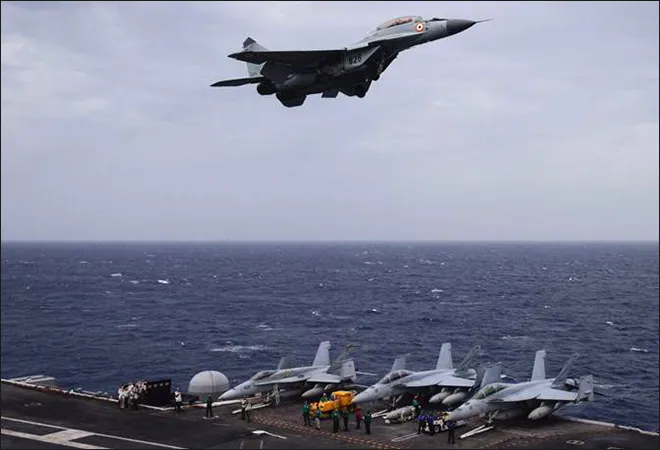
The Quad’s journey has been a conscious balance of not diluting other regional architectures like ASEAN while avoiding being touted as an echo chamber. It has succeeded in incubating ideas backed by a template of action-oriented partnership. However, as India gears up to host the Quad Summit in 2024, it will be Delhi’s opportunity to rebalance the focus on the ‘Indo’ in the strategic frame of the Indo-Pacific.
The Quad’s Sydney summit got caught in the crossfires of the United States (US) debt ceiling debate. However, effective coordination alongside the high-powered diplomacy at G7 ensured that the Quad’s Hiroshima meeting upheld the positive momentum on practical cooperation, and more importantly, delivered. And it did not disappoint. Even the Chinese
perception acknowledged that the Quad has done its ‘homework’.
As India gears up to host the Quad Summit in 2024, it will be Delhi’s opportunity to rebalance the focus on the ‘Indo’ in the strategic frame of the Indo-Pacific.
While the conceptualisation of a
strategic diamond, comprising the US, Japan, Australia, and India, was engineered by one of the sharpest minds of our times, former Japanese Prime Minister Shinzo Abe, it had a slow start in 2007, being hostage to domestic politics of the day. Even with its resurrection a decade later in 2017, the conversation amongst the Quad policy elites matured over the years, and it is only in 2021 that the Quad could frame its first joint statement.
The Quad has come of age with a wide-ranging agenda—across health security, the Indo-Pacific Partnership for Maritime Domain Awareness (IPMDA), the Partnership for Cable Connectivity and Resilience, and the Quad Investors Network (QUIN) pursuing co-investment in critical technologies and advancing Commercial Open RAN Deployment in Palau. Analysing the successive Quad Leaders’ joint statements points to innovative forward thinking and the ability to translate them into tangible solutions.
Divergences within the Quad—be it towards the Ukraine conflict, mega free trade agreements or even India’s
maps—have not constrained the group from weaving a coherent agenda anchored on issue-based strategic alignment wherever possible. Debunking
Beijing’s narrative of the Quad being an “Asian NATO”, the Quad’s objective of bringing collective capacities to deliver practical solutions in the Indo-Pacific has gained considerable traction.
A few Southeast Asian powers believe that the Quad ‘will be constructive for the region’. There is a school of thought arguing the case for
closer ASEAN-Quad cooperation since the Quad’s resources can not only facilitate robust capacity building amongst a few ASEAN member states but ASEAN can also influence the Quad’s strategic thinking on the Indo-Pacific through ‘institutional cooperation’.
However, it is time to push the envelope in the Indian Ocean. The Quad’s
Vision Statement argues the vitality of aligning agendas and respecting ‘the centrality, agency, and leadership of regional institutions, including ASEAN, the Pacific Islands Forum, and the Indian Ocean Rim Association’.
While Washington remains preoccupied with the Western Pacific and ignores the western Indian Ocean, Australia’s
primary area of interest is the immediate region encompassing the northeastern Indian Ocean through maritime Southeast Asia into the Pacific. Taiwan, East and South China Seas, alongside the Pacific Islands constitute the centrepiece in the maritime security conversation in the power corridors of Washington and Tokyo.
As the Indian Ocean hosts critical chokepoints and maritime highways, keeping it free and open is as important as doing so in the Pacific.
As the Indian Ocean hosts critical chokepoints and maritime highways, keeping it free and open is as important as doing so in the Pacific. With India hosting the 2024 Leaders’ Summit, it will be Delhi’s opportunity to draw the Quad’s focus towards the Indian Ocean.
As the Quad has invested in drawing synergies with the ASEAN Outlook on the Indo-Pacific (AOIP), it will also be imperative to raise the game in the Indian Ocean and develop ‘habits of cooperation’, especially now that India, alongside other regional stakeholders, has adopted the
IORA’s Outlook on the Indo-Pacific (IOIP). The IOIP echoes common concerns of resilient regional value chains, debt sustainability, infrastructure and connectivity, advancing digital linkages, and securing cyberspace. The Quad could draw on the synergy with the IOIP’s categorically defined six priority areas, especially maritime safety and security, and disaster risk management.
As India anchors the Indo-Pacific Ocean’s Initiative (IPOI), the Quad could also co-opt any of the seven pillars that aligns perfectly with its priorities. Japan and Australia respectively work with India on the connectivity and maritime ecology pillar. IPOI has gained currency within the region, with France and Indonesia working on the maritime resource pillar and Singapore opting for the academic and science and technology pillar.
The collective capacity of the Quad would be complementary to the IPOI. Since the idea of the Quad germinated during the Indian Ocean tsunami core group activities, it could co-opt IPOI’s disaster risk reduction and management vertical. It can draw from the Sendai Framework for Disaster Risk Reduction (SFDRR), advancing effective mitigation strategies to ease vulnerabilities rather than simply reacting to disasters. This would further complement efforts undertaken within the frame of the Coalition for Disaster Resilient Infrastructure (CDRI) together with the Infrastructure for Resilient Island States (IRIS) Initiative, which aims to help small island developing states in mobilising technology and finance.
With the Quad’s new Partnership for Cable Connectivity and Resilience
, India can leverage its strategic geography, demographic dividend, and skilled workforce including IT to present itself as a
regional hub for the submarine cable network, enabling transport of data across the Indian Ocean, which hosts some of the fastest growing economies. India’s Quad partners have already featured cooperation through the US-Japan-Australia Palau Spur Cable project. Also, addressing
security risks together with other Indo-Pacific partners and information sharing on subsea threats is imperative.
Meanwhile, the IPMDA is a gamechanger. The recent launch of a new satellite cluster by HawkEye 360 is expected to be a force multiplier. The substantive commitment, through pilot programmes envisaged across Southeast Asia, the Pacific Islands, and the Indian Ocean Region, will pay rich dividends. Meanwhile, Delhi has supported regional capacity building by setting up a coastal radar chain with Maldives, Mauritius, Sri Lanka, and the Seychelles. For the Quad, success will be contingent on seamless information sharing and developing operational synergies.
The Quad’s infrastructure financing, resources and capacity building can be further leveraged to pursue Delhi’s goal of connecting to Southeast Asia and anchor economic linkages as the conversation on economic security takes centre stage.
In the Indian Ocean, Delhi
considers ‘efficient and effective connectivity to ASEAN, in particular, will be a game-changer.’ The Northeast of India remains a key frontier in Delhi’s Indo-Pacific calculations given its strategic geography over the Bay of Bengal. India has a trusted partner in Japan when it comes to advancing regional infrastructure and connectivity corridors in the region having
launched the Bay of Bengal-Northeast India industrial value chain. The Quad’s infrastructure financing, resources and capacity building can be further leveraged to pursue Delhi’s goal of connecting to Southeast Asia and anchor economic linkages as the conversation on economic security takes centre stage.
In hosting the Leaders’ Summit in 2024, India should bring greater balance to the Quad's strategic focus, with the Indian Ocean being as much a priority as the Pacific. India has made some bold choices as a host nation in recent times. A small step, perhaps packing a punch, would be to host a few Quad-related meetings in the Andaman and Nicobar Islands.
Dr Titli Basu, is an Associate Professor at Jawaharlal Nehru University (JNU).
The views expressed above belong to the author(s). ORF research and analyses now available on Telegram! Click here to access our curated content — blogs, longforms and interviews.



 The Quad’s journey has been a conscious balance of not diluting other regional architectures like ASEAN while avoiding being touted as an echo chamber. It has succeeded in incubating ideas backed by a template of action-oriented partnership. However, as India gears up to host the Quad Summit in 2024, it will be Delhi’s opportunity to rebalance the focus on the ‘Indo’ in the strategic frame of the Indo-Pacific.
The Quad’s Sydney summit got caught in the crossfires of the United States (US) debt ceiling debate. However, effective coordination alongside the high-powered diplomacy at G7 ensured that the Quad’s Hiroshima meeting upheld the positive momentum on practical cooperation, and more importantly, delivered. And it did not disappoint. Even the Chinese
The Quad’s journey has been a conscious balance of not diluting other regional architectures like ASEAN while avoiding being touted as an echo chamber. It has succeeded in incubating ideas backed by a template of action-oriented partnership. However, as India gears up to host the Quad Summit in 2024, it will be Delhi’s opportunity to rebalance the focus on the ‘Indo’ in the strategic frame of the Indo-Pacific.
The Quad’s Sydney summit got caught in the crossfires of the United States (US) debt ceiling debate. However, effective coordination alongside the high-powered diplomacy at G7 ensured that the Quad’s Hiroshima meeting upheld the positive momentum on practical cooperation, and more importantly, delivered. And it did not disappoint. Even the Chinese  PREV
PREV


